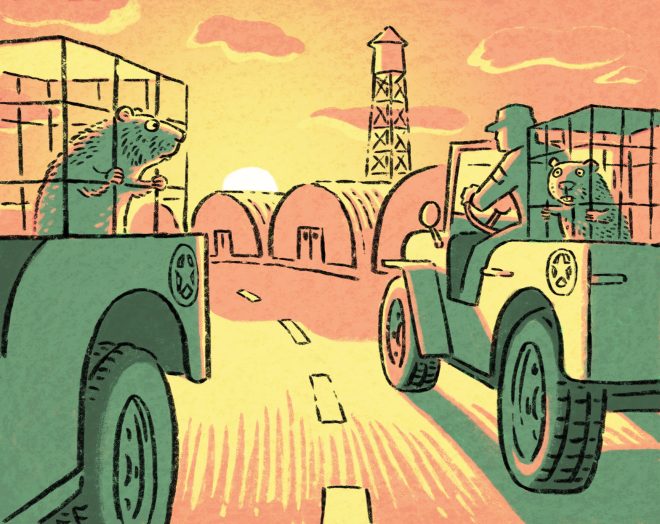Read by Pat and Becky Stone

Not too long ago, I happened to drive by the old Navy base at Quonset Point, Rhode Island, where my dad had been stationed when I was in my teens. The base was now decommissioned, and the land and buildings were transferred to civilian hands. I drove past the empty Quonset huts and into our old neighborhood, revisiting the stomping grounds of my high-school days. In the front yard of our old house, I noted two groundhogs munching contentedly on the grass. My memory was suddenly transported to the year I turned 16.
Our first Summer at Quonset, my father claimed a patch of land near the trees that separated our yard from the twelfth hole of the military golf course. There he indulged in one of his favorite hobbies: gardening. He grew a good variety of vegetables—and an excellent crop of golf balls. My dad figured anything that landed in the garden was his to harvest. He collected the balls in little nests and left them on the doorsteps of neighborhood golfers on Easter morning.
Once the first garden was thriving, he started another in a vacant field behind the houses across the street. There he established strawberries, asparagus, and some raspberry bushes. On that side of the road there were no golf balls, just the occasional groundhog. My sister Judy and I helped him out now and then and learned to love the taste of sweet strawberries popped into our mouths on hot Summer days.
Being adolescents, however, we spent more time hanging out with friends than helping out Dad. It was the 1960s, and although we were military brats, we were also children of the sixties. One day we found ourselves in a debate with our friends over the issue of pacifism versus military intervention.
“How can you be pacifists?” our friends asked. “Your dad is in the military, the same as ours.”
“That’s different,” I said. “He’s a doctor.”
“Yeah?” asked one boy, whose house was near the raspberry patch. “Well, I saw your dad clobber a groundhog to death with a shovel. In cold blood.”
Was this true? Judy and I dropped our attempt to convert military brats into pacifists and went on a fact-finding mission. We confronted our father and asked if it was true.
“Partly,” Dad admitted. “But I only clobber groundhogs if I can catch them. Usually I just stuff gasoline-soaked rags down their holes and try to asphyxiate them. Have to. Those nasty groundhogs eat everything in sight.”
Judy and I were shocked. A Great Military Groundhog Battle was in full swing on the borders of our own homeland, and we didn’t know anything about it. Our father clearly felt it was within his rights to kill any hapless groundhog who came near his garden.
We had to do something. Judy and I held a two-girl meeting. “If we want to stop this,” Judy said, “we’ll have to come up with a peaceful way to end the conflict.”
After our two-person, think-tank session, we came up with a plan. We pooled our allowances and bought my father a Havahart trap. Under a hard-negotiated peace accord (I think we promised to clean our rooms.) my dad agreed to use it.
This added a new garden chore to the usual weeding and harvesting. My dad now had to drive, usually after sunset, to the Seabee station on the other side of the base. There he would open his trap and release a recently caught groundhog. This happened, on average, about once a week.
My sister and I were happy to have found a nonviolent solution to the problem. Though there continued to be some groundhog damage to the garden, it was minimal, and Dad could live with it.
Sometime later after my father had been transferred to another military base, he got to talking with a Seabee, and they realized they had both been stationed at Quonset at the same time. They also found they had a common love: gardening.
“The hardest part of gardening at Quonset was those darn groundhogs,” my father declared. “I used to catch them in a Havahart trap and release them over on your side of the base.”
“You’re kidding!” his friend said. I used to catch groundhogs and drive over at night to release them by the golf course.”
They chuckled as they realized they probably had been transporting some of the same groundhogs back and forth to feast on each other’s gardens. My father hoped they had at least kept the population down by interrupting their reproductive cycle, but realized that more likely they just strengthened the gene pool.
The day I drove past the deserted homes, I could see that my dad was right. Now the groundhogs were everywhere. A fat groundhog ambled across the street, oblivious to my approaching car. Another waddled down the sidewalk. They ate contentedly in the yards. Holes pockmarked the landscape.
A great occupation force, they had taken over our neighborhood’s streets, yards, and sidewalks. Whether because of our intervention or in spite of it, those “darn groundhogs” were thriving.
The Great Military Groundhog Battle was over and, clearly, the groundhogs had won.
I didn’t tell my dad. ❖


